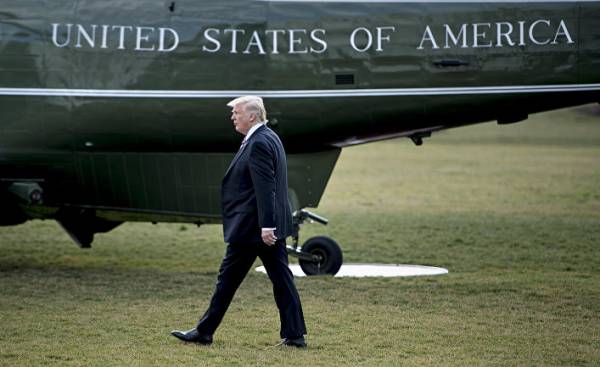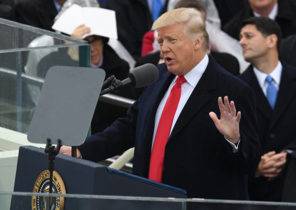
When in 2013 was published the original edition of the new biography of Hitler (“Hitler: the rise to power, 1889 — 1939”; Hitler: Ascent 1889-1939), authored by Volker Ulrich (Volker Ullrich), the current political situation in the United States it was hard to even remotely imagine. Of course, the perception of the book often goes beyond the author’s intent and the conditions in which it was written, but this happens rarely as dramatic as in this case. In early 2017 it is impossible for any American to read the recently published English translation of this book beyond the darkness cast by our new President.
First of all, I would like to emphasize that trump is no Hitler, and the American Republic in the twenty-first century cannot be compared with the Weimar Republic. There are many important differences as regards people and as regards the historical conditions in which these people came to power. However, there is sufficient to a certain extent, similar areas, which make the content of this book intimidating and deep, not only in respect of the past but to the present.
Ulrich comes to the conclusion that the initial period of Hitler’s life was not distinguished by the poverty and the hardships, as he later depicted it in his book “My struggle” (Mein Kampf). Even after the death of first his father and then his mother, he received various benefits as an orphan, and besides, he was left a small inheritance. In those periods of life when these funds are not enough, Hitler, actually, was destitute and was forced to live in the male Dorm, in order to somehow make ends meet he sold his drawings. In addition, for some time he experienced what it means to be homeless. More important was the fact that at age 25 — he had no education, no training, no experience — he is still undecided in life, had no support either from family members or from friends, and he had no prospects. All this is very different from the privileged life of Donald trump — a prestigious and expensive private schools, as well as significant financial support from the father for the entry into the world of business.
For Hitler the First world war was a decisive experience that contributed to the formation of his personality. He volunteered for the Bavarian army, took part in fierce fighting on the frontline in the autumn of 1914, and then miraculously was able to stay alive by performing for four years, the responsibilities of liaison between the regimental headquarters and the trenches on the front line. For Hitler, the war meant the structure, camaraderie, and, besides, it gave him a sense of higher purpose, which replaced a weak-willed existence, loneliness, and hopelessness; and he completely merged with the war. The only tragedy of Hitler was the defeat of Germany, and, in his opinion, the war had to resume once will have accumulated enough power to win.
For trump, the war in Vietnam was a minor inconvenience — he got four deferments from conscription to continue education, and then he was released from service for medical reasons due to a bone spur, and his self-proclaimed heroic equivalent was that he didn’t catch a venereal disease, despite a vigorous campaign, filled with boundless and promiscuity. And in regard to the war, and in regard to childhood, Hitler and trump received a totally different experience.
Ulrich comes to the sexual life of Hitler from the point of view of common sense, he refrains from sensational accusations of latent homosexuality, sexual perversions, who allegedly forced him to project on Jewish self-loathing, the lack of sexuality and the related inability to establish normal human relationships, or in the presence of abnormal genitalia that let — psychologically or physically — to normal sex. In his opinion, Hitler (he refused to join his comrades, when they went to a brothel), remained a virgin at least until after the first world war, but he preferred not to talk about his relationship with women.
Discreet and lightweight Eva Braun (she was his Junior by 22 years), which is constantly concealed from the public, is fully consistent with the desire of Hitler to support the idea that his complete devotion to his main affair was far beyond any purely physical needs or desires. Again, the contrast is huge — trump flaunting their spectacular three wives and brags about the number of his sexual conquests, his ability with impunity because of his fame to commit sexual harassment.
In his speech to the workers of the Krupp factory in Essen in March 1936 Hitler said: “I guess I am the only statesman in the world who has no Bank account. I have no shares, no shares of any company. I do not receive any dividends”. Hitler was cultivated as the image of a man overcoming a physical need in dealing with women and the image of the ascetic, devoid of any material needs. In fact, the neg was a large apartment in Munich, and also extended and rebuilt the Villa in Berchtesgaden, in the Bavarian Alps, and, besides, he loved his Mercedes. He received royalties from the publication of the book “Mein Kampf”, and also had access to secret funds to bribe the right persons and therefore in no need. However, these modest items of luxury is not flaunted to the less affluent Germans.
The insatiable greed and corruption of many of his colleagues — from boastful Hermann Goering to the local “little Hitler”, so shamelessly used the power for their own enrichment — increased the contrast with his ostentatious asceticism. This appearance of the simple life helped to keep intact the image of the führer, while the luxurious life of Union leaders and functionaries remained the focus of attention of public discontent.
And this is another contrast to Donald trump, because no other business can boast since its richness and its gilded name, and his entry into politics only increased the audience for bragging rights. After his election, Donald trump has abandoned all traditional restrictions against conflict of interest and has not transferred its assets to a “blind” trusts, but included his administration colleagues-billionaires. The constitutional provisions on revenue, until recently, were not questioned because of the universally accepted axioms of American political life may remain (given the dominant position of the Republicans in the House of representatives, at least until 2018 and probably beyond 2018), while in America on an unprecedented scale rampant corruption, kleptocracy and the “wild capitalism”.
Although Hitler and trump had a completely different childhood and different military experience, on the one hand, and the treatment of women and of wealth, on the other hand, the historical conditions in which they made his political ascent, have certain similarities. Within one generation the German society experienced a series of extraordinary crises — four years of total war, which ended in an unexpected defeat; a political revolution, which resulted in the semi-parliamentary/poluavtomaticeskij monarchy was replaced by a democratic Republic; the hyperinflation that turned to dust accumulation of the middle class and naslavcha above the bourgeois values of the type of thrift and deferred compensation, but gave rise to frenzied speculation; and, finally, the Great depression, with its dramatic unemployment than in the most difficult periods 30%.
For many Germans, the catastrophe was aggravated also due to three common, but false assumptions: the war was lost because of the “stab in the back” on the domestic front, not because of poor decisions and reckless gambles the military leadership; the Treaty of Versailles was huge, undeserved and unprecedented injustice; not only the Communists and moderate social Democrats, irresponsible liberals and the Jews brought the Germans to lose to the “fetters” of Versailles, and Germany threatened by the arrival of “Jewish Bolshevism”. According to Ulrich, in a greater degree it is this toxic mixture, which has absorbed Hitler in postwar Munich and not experience his life in prewar Vienna (regardless of how he portrayed it in the book “Mein Kampf”) transformed him from a complete jerk into a violent anti-Semitic ideologue and radical politics.
The experience of Americans in recent years consisted of a series of disasters on a national scale, and of unequal suffering. After two long wars in Iraq and Afghanistan, and after the very real threat of total economic collapse in 2008-2009, many Americans rejoiced in the return of comfort, safety and even prosperity, when as wealth continued to concentrate at the top. Except sector of the population that supplies the majority of recruits for our national army, endlessly repetitive missions in war zones, indeterminate results of the wars in which they participated, as well as increasing chaos in the middle East and emanating from there, the threat of terrorism — all this is discouraging and demoralizing.
For industrial workers and miners who have lost the robot due to automation, globalization and growing concerns regarding the environment, occurring after 2008, the economic stagnation meant the inevitable onset of unemployment, a significant drop in living standards and the almost complete lack of hope for the restoration of their lost status and income.
For the first time, the life expectancy of white Americans in middle age without a higher education decreased significantly, primarily due to “diseases of despair” — alcoholism, drug addiction and suicide. For social conservatives (mostly white and Christian environment, as well as deference to male dominance was taken for granted and as an integral part in the formation of American identity) demographic growth and political activism of non-white minorities, the emergence of the rights of women and the transformation of society’s attitude to homosexualism, especially among the younger generation, was unexpected and alarming for many. The division of society into parts that are not quite lucky John Edwards (John Edwards) once called “the two Americas” continues to deepen. One part sees a functioning and progressive America, while the other looks pessimistic and considers America to be poorly functioning and failing.
What would equipollent in the degree of severity of the situation in these two countries, a large number of Germans and Americans have experienced numerous political crises, economic failures, humiliation abroad, and also cultural and moral decay at home. And Hitler and trump called their country “losers,” and himself suggested as the only solution in the face of the current crisis, and promised a return to the glory days of an imagined Golden past. Hitler promised to be a great “update” of Germany, and trump promised to “make America great again”. They both rejected the old rules and come up with unprecedented ways of conducting their political campaigns.
Both they set up a charismatic relationship with their “grassroots” supporters, and it was done mainly during mass rallies. They both underlined its status as the “outsider” and criticized the establishment, the privileged elites and corrupt special interest groups. They had both expressed dissatisfaction with their enemies (for Hitler it was “the November criminals” and “Jewish Bolsheviks” for trump’s “Mexican rapists”, “radical Islamic terror” and “dishonest” press). And they both were able to benefit from the fact that they seriously underestimated the experts and rivals.
Although they both created a coalition of disgruntled, their constituents were quite different. The first groups captured Nazi most, were student organizations on College campuses. In 1930, during his electoral breakthrough, the Nazis won a significant majority of the votes of those people who voted for the first time, primarily young people. Basically, the Nazis stole to their side voters who voted previously for other parties middle class, and, in addition, women from different social groups voted for the Nazis in the same proportion as men.
But there were two groups of voters, in respect of which the Nazis did not achieve much success — we are talking about voters religious unit in Germany (in that election, Catholics voted for his centrist party), as well as “blue collar” industrial workers (they often changed their preferences and did not vote for losing their influence, the social Democrats and the radical Communists and then the Nazis). However, the Nazis had their supporters among the wider German society than their opponents — the party-oriented classes, or any separate social group. The Nazis could not without some reason to boast that they were the only “people’s party” in the country.
Eventually, the Nazis created a solid Foundation and obtained a decisive majority in the German multiparty system. Their party received 37% of votes held in the July 1932 elections, in the course of the last two free elections, they were able to recruit only 33% of the votes, and in March 1933, the manipulation of elections provided them with 44% of the vote.
Unlike Hitler, whose party has taken voters from other parties, trump has not established its own party organization, however, has made support of the Republican party on the results of the primary election and closed party meetings. Despite this “hostile takeover” and personal shortcomings trump, the traditional Republicans (including women, the change in the electoral behaviour which were incorrectly predicted) actively supported him in the General election, and did the same evangelists. While Democrats failed to preserve existed at the Obama level of mobilization of voters among African Americans and young people.
In addition, they are unable to enlist the support of former voters among blue-collar workers in the industrial States of the Great lakes region (especially Wisconsin, Michigan and Pennsylvania), which in the previous presidential election voted for Obama, but for three elections at the level of States has not supported the Democratic party. Trump received 46% of votes in the essentially two-party races exceed the maximum Hitler received 44% in the race with many participants, but his voice was strategically distributed, and that was enough for victory in the electoral College, even though Hillary Clinton received almost three million more votes across the country.
While trump has secured the presidency in the legitimate from the point of view of the Constitution of the victory in the electoral College, Hitler was not able to get into the position of Chancellor with the help of triumph in the elections and the parliamentary majority. Rather, he came to power as a result of a transaction with representatives of the elites of German nationalists and authoritarian conservatives with President Paul von Hindenburg. Mobilizing substantial popular electoral base (the old parties failed to do so), Hitler proved to be necessary for the implementation of their plans, in accordance with which to replace the weakening of the Weimar democracy had come to an authoritarian rule.
As it perfectly shows Ulrich, not the inexorable rise of the Nazis, but rather the first signs of fall in their popularity in the elections in November 1932 (the party was exhausted, she was bankrupt and demoralized as a result of ongoing election campaigns and will not provide final victory) made the representatives of the conservative elites to accept Hitler’s demands regarding the post of Chancellor, and all this happened before his stubborn resistance was able to destroy his own party and then the conservatives would be opposed to the left, deprived of popular support.
Many of the goals of Hitler and the conservatives coincided — a departure from the Weimar parliamentary democracy; re-waiver of the provisions of the Treaty of Versailles and the restoration of the 1914 borders; the suppression of the “Marxists” (that is, social Democrats, trade unions and Communists) and emancipate German Jews. The fundamental position of the conservatives was that they, of course, will control Hitler and use it to implement their own agenda, and not Vice versa.
Trump is a populist, and traditional Republicans have also signed a deal regarding collaboration partly in order to implement the General plan: tax reform with a special emphasis on relief for the wealthy part of the population; deregulation of business and banking activities; reducing the protection of the environment by denying the impact of human factors on climate change; the appointment of people such as Eugene Scalia (Eugene Scalia) to the Supreme Court; waiver imposed by President Obama for the program of medical support; increasing the number of deportations of undocumented immigrants and “closing the borders”; redirection of resources from public to Charter schools (charter schools); the empowerment of individuals or businesses in relation to vulnerable groups in the name of religious freedom; termination of the right to abortion; and at the state level — the intensification of the suppression of voters.
However, it is unlikely that Mitch McConnell (Mitch McConnell), Paul Ryan (Paul Ryan) and other Republican lawmakers share the enthusiasm trump about infrastructure package in the amount of a trillion dollars; it promises not to cut social welfare programs and health services; replacement wide and regional trade agreements to narrow the bilateral trade agreements, as well as some magic tricks related to the reopening of the closed mines, steel mills and other factories. Probably some of the promises trump will be set aside (as is, apparently, already happening with his proposal for programs in healthcare, which covers more people, provides better care at lower costs, but it does not satisfy enough the most traditional conservatives); and on the horizon already looming other conflicts.
And Hitler and trump signed a deal with the conservative political partners on the basis of partially overlapping objectives and misconceptions, but for trump it is almost impossible to consolidate absolute power, and he can’t get rid of his allies completely and with the same speed, as did Hitler.
One of the most scary parts of the book of Ulrich on the formation of the Nazi dictatorship. On the basis of the emergency decree of President Hindenburg (they are not subjected to legal assessment) freedom of the press, freedom of speech and freedom of Assembly were suspended during the first weeks after their introduction. The process of execution of laws and the independence of the state governments ceased to exist during the first month, while the government was able to detain citizens indefinitely and send them to concentration camps without charges, without judicial process and without trial. In addition, did not support the Nazis of the land government was replaced by a Nazi special commissioners.
The sixth week was banned by the Communist party, and the Constitution as a whole was set aside in favor of Hitler (and not in favor of the Hindenburg), which was to rule on the basis of decrees. The third month was abolished, equality before the law, based on the first anti-Jewish decrees and carried out purges among civil servants, and for the fourth month was abolished labor unions and the Social democratic party. The remaining parties themselves dismissed in the fifth month. In June 1934 Hitler held a “bloody purge”. Among her victims was former Chancellor Kurt von Schleicher and his wife, as well as hundreds of other people who were in the squeak of enemies of Hitler. Former Vice-Chancellor Franz von Papen, contributed to the rise of Hitler to power, was sent Ambassador to Austria. This can be compared with the murder of Hillary Clinton and bill Clinton on their front door, and with the direction of Mike Pence’s Ambassador to Canada.
Partly due to the fact that trump is not an independent party and loyal to him personally paramilitaries, and partly because American democracy is not weakened to the same extent as was weakened the Weimar Republic, the emergence of such a political whirlwind and creating a dictatorship is impossible in 2017. Courts continue to give a legal assessment and to carry out the relevant processes, the governors of such States as California and Washington dismissed and not replaced, the right to freedom of speech, press and Assembly remains intact and conforms to the bill of rights, while opposition parties not prohibited by law.
Equally important is the fact that a large number of people frequently and visibly exercise their right to Assembly and freedom of speech and the media are not trying to integrate with the new regime, and during that administration officials subjected their critics, calling them “opposition” and “enemies of the people”. No matter what authoritarian tendencies trump and several members of his entourage, they face limitations, which Hitler was not.
Ulrich has consistently emphasized two factors: the ideological Foundation of Hitler, on the one hand, and the fact that he wasn’t trying to hide it from others. On the contrary, to get an idea about this, could everyone who wanted it. In the first post-war biography of Hitler, Alan bullock viewed him as a tyrant, rushing toward power for the sake of power, whereas Ulrich, based on the research of the 1960s, especially the work of Icela Eberhard (Eberhard Jäckel). He showed in detail how during the 1920-ies was the crystallization of the ideology of Hitler in relation to race as a driving force of history. He believed that the Jews represent the largest threat to the racial purity of Germany and its fighting spirit, and therefore to her ability to lead the eternal struggle for “living space” necessary for the preservation and increase of the population of Germany and victory over her enemies.
Ulrich also considers the outcome of recent studies, according to which the world of Hitler was not premeditated by any program or plan, and provide a separate parameters and guidelines for the Nazi racial and foreign and military policy, developing and becoming more radical over the 12 years of the Third Reich. Described in the book “rise to power” event end in March 1939, when the occupation takes place in Prague, that was the last bloodless victory for Hitler. However, Ulrich is clear that driven by the ideology of Hitler’s career was bound to lead to war and genocide.
As for trump, we have, of course, no historical perspective, no ideological basis. The prevailing impression is that his ego and need for adulation and his inability to see the simple reality and to tell the truth, when his ego is threatened, are his driving force, not his ideology. Among his appointees, however, there is a faction of Steve Bannon and Steven Miller, released from circles news portal Breitbart, and they are supporters of the concept that’bannon euphemistically calls “economic nationalism.”
It includes the theory of white supremacy, Lenin’s “destruction” of the administrative state during the New deal and the cold war, Islamophobia (especially in regard to the Titanic and irreconcilable clash of civilizations between Islam and the West), dismantling the current international order (UN, EU, NATO, NAFTA, etc.) in favor of a return to unlimited, self-confident and homogeneous nation-state, proximity to Putin’s Russia and other ultra-nationalist and authoritarian movements in Europe, apocalyptic historical vision of the end of the current era (roughly 80-year cycle that began in the 1930-ies) and the beginning of a new era in the near future.
Trump sufficient shares these views in order to make’bannon chief strategist of his administration, and his easy recourse to racist language is a myth about the place of birth (Obama), Mexicans are rapists and criminals, a ban on the entry of Muslims, slogan (Charles) Lindbergh, “America first” — makes clear that he feels quite comfortable by pandering to racist views. However, it remains unclear the question of whether to have part of its ideological baggage priority over the Central agenda of his self-aggrandizement. The future direction of the administration trump is heavily dependent on the victory of the faction Bannon-Miller on groups of traditionalists, military, and billionaires, trump appointed to important posts.
Ulrich also shows that the phenomenal growth of the popularity of Hitler and his ability to win the majority support from the majority of those who did not vote for him — was, in fact, the result of his dual achievements: a series of bloodless victories in foreign policy, on the one hand, and economic recovery (especially of a return to full employment), on the other hand. Full employment was accompanied by, primarily, the modernization, which was carried out at the expense of huge deficit spending, and huge trade deficit, which arose as a result of concluded bilateral deals. They have created an economic house of cards in which the frenetic pace of preparation for the great war in 1942-1943 required to take such risky actions as the seizure of resources of Austria and the Czech Republic without the risk of the outbreak of war in 1938 — 1939. Infrastructure program for the construction of highways was minimal and mostly cosmetic part of the economic recovery.
Trump also put his political future dependent on the fulfilment of the promises concerning the 4-percent growth, open coal mines, steel mills and factories in the distressed economic regions, and all new negotiations of trade agreements (they were based on the principles of mutual benefit) and replace bilateral trade deals, where America wins and all other parties lose. In this respect, his goal for bilateral trade agreements is in direct contrast with the policies of Hitler, that is, trump is trying to achieve a surplus, while Hitler was partially paid for urgent re-equipment due to the trade deficit, which was supposed to pay sometime in the future with the occupation (this option was considered preferable). Trump is tied to a political party, which traditionally supports free trade and does not like deficit spending for any other purpose than providing tax breaks for the rich, increase the military budget and justification of budget cuts on social protection of the population.
It is not clear how it will be possible to fulfill the promises trump regarding the health, welfare, public medical assistance and reconstruction of the destroyed industry, especially in the atmosphere the potential of trade wars, higher cost of living due to import duties, reducing competition, and eventual fall is now quite successful high-tech export industries and agricultural businesses that need export markets, and cheap labor of the migrant.
Tax cuts, deregulation and reckless attitude to the environment are the Republican panacea for the economy. Will this be enough even for temporary growth (before the bubble burst, and will need to pay the bills, as happened with George W. Bush in 2007 and 2008) and to be able to avoid the economic and political deadlock, in which he himself drives? In this respect, the future direction of the administration trump also remains unclear.
Hitler and national socialism should not be seen as a normal historical pattern for authoritarian rule, a risky foreign policy and persecution of minorities, because they are extreme examples of totalitarian dictatorship, unlimited aggression and genocide. They should not be easy to give an example, or to pay into banality through superficial comparisons. But even if there are many significant differences between Hitler and trump and between the respective historical conditions, however, the question arises: what conclusions can come a reader written by Volker Ulrich new biography of Hitler, which would allow us to better understand our present situation?
First, you have to pay a high price for the consistent underestimation of the charismatic political outsider just because someone in accordance with their own standards and views (in my case, it can be liberal representatives of the academic world) will find his character flawed, his ideas repulsive, but his pleas unintelligible. And this is true not only in relation to the period of his incredible rise to power, but to an even greater extent after that. Secondly, to give the possibility desperate in economic terms people get the job in any way mean that they would be willing to forgive a lot to this leader, whatever his faults, and to provide at least passive support of others to its purposes.
Here is what James Carville (James Carville) in 1992 during the presidential campaign (bill) Clinton: “It’s the economy, stupid”. Third, the assumption that conservative and traditionalist allies — no matter how necessary they may be — will control such fast successful leaders is a dangerous attempt to wishful thinking. If the conservatives are unable on their own to gain power without partnership and popular support for such latter-day leaders, their ability to control these kinds of people seem to be questionable at best.
Fourth, the best option for defense of democracy must first and foremost attack. Parliamentary government in the Weimar Republic was replaced by the government appointed by the President, the Chancellor, who ruled from 1930 through emergency decree as undemocratic President. In 1933, Hitler just used this temporary post-democratic system for the establishment of a totalitarian dictatorship, and he did it with incredible speed and without serious resistance. If we are still able to effectively protect the American democracy against dictatorship, one of the lessons of studying the fall of the Weimar Republic and the ascent to power of Hitler is how important it is to do this at an early stage.







